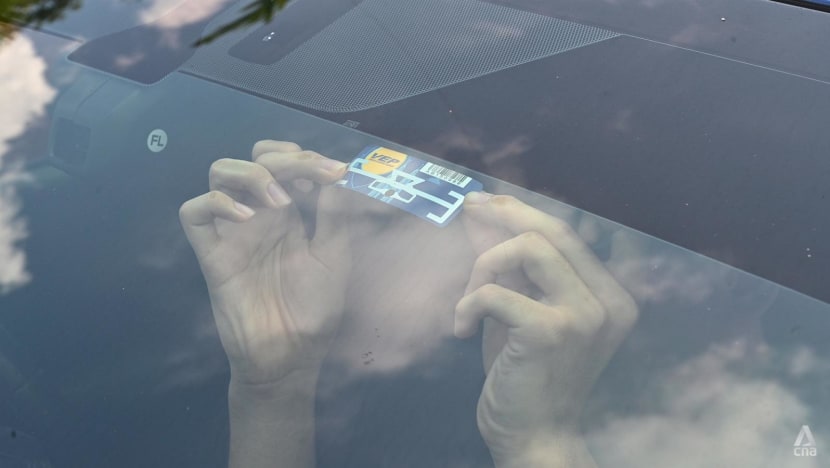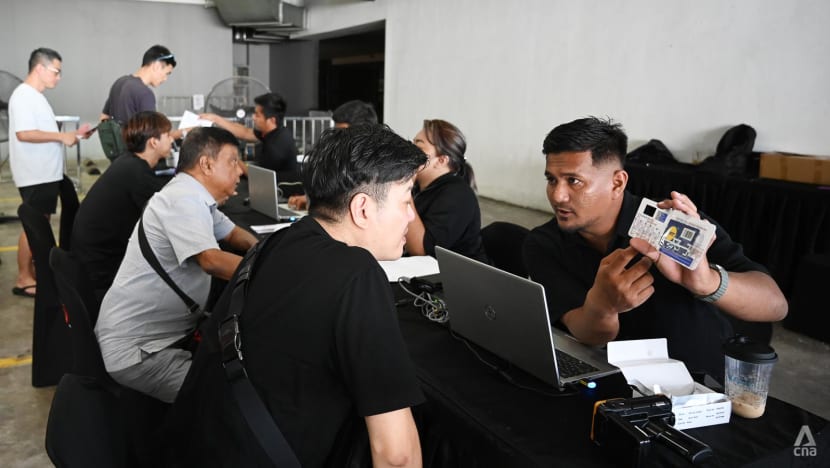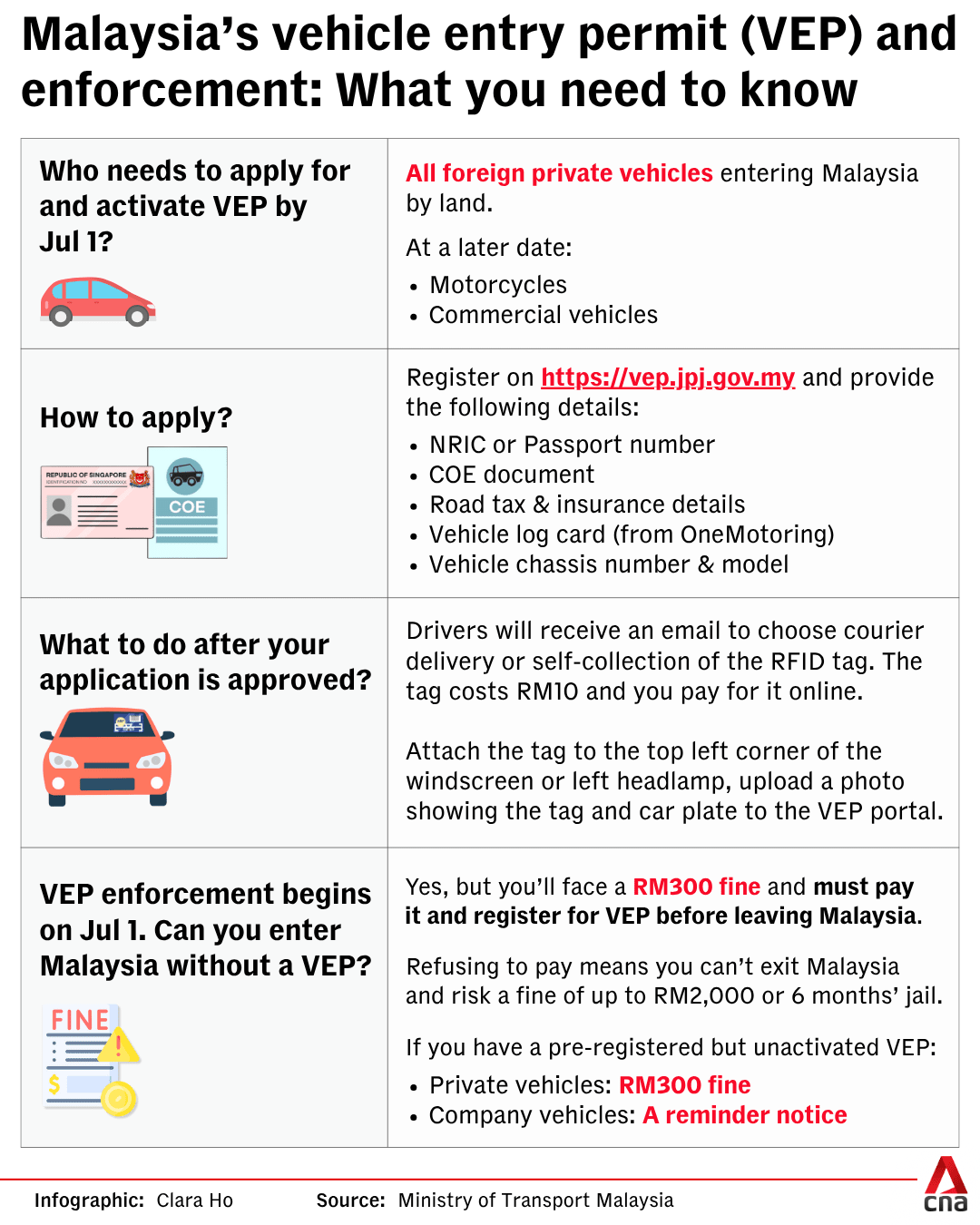Malaysia's VEP: US$70 fine for errant foreign motorists as full enforcement starts Jul 1
Private individual vehicles without valid VEPs must pay the fine and complete VEP registration before exiting Malaysia. Those with pre-registered but unactivated VEPs will also receive fines and have to pay them before leaving the country, said the transport ministry.

A technician installing a Vehicle Entry Permit RFID tag on the windshield of a Singapore-registered car. (Photo: CNA/Zamzahuri Abas)

This audio is generated by an AI tool.
KUALA LUMPUR: Malaysia will start issuing summons of RM300 (US$70.65) to foreign vehicles without Vehicle Entry Permits (VEP) at its land borders with Singapore from Jul 1, Malaysia’s Transport Ministry said on Wednesday (Jun 4).
“From this date, summonses will be issued to foreign vehicle owners who have not registered or activated VEP,” the ministry said.
For private individual vehicles without a valid VEP, the summons must be paid and VEP registration completed before exiting Malaysia.
Private individual vehicles with pre-registered but unactivated VEPs will be issued summons, and payment must also be made before exiting Malaysia, the ministry said.
The same applies to private company vehicles without a valid VEP, but such vehicles with pre-registered but unactivated VEPs will be issued a reminder notice instead and be allowed to exit Malaysia.
This is because drivers of such vehicles have experienced issues with registering the VEP e-wallet under a company name, Transport Minister Anthony Loke said.
“There are quite a lot of vehicles in this category that are still in the registration process due to incomplete documents,” Loke told reporters at the Ministry of Transport in Putrajaya.
A new system is in place to allow them to complete the process, he added. “So, we are still giving them time to get used to this new system.”

GRACE PERIOD ENDING AFTER NINE MONTHS
The ramping up of enforcement takes place nine months after Malaysia began requiring all foreign-registered vehicles entering the country by land from Singapore to use VEPs on Oct 1 last year.
The transport ministry said as of Monday (Jun 2), a total of 231,018 VEP tags have been issued to private individual vehicles, of which 194,507 have been installed and activated. It said 36,511 of the tags have not been activated.
A total of 2,660 VEP tags have been installed and activated for private company vehicles, it said.
Motorists have been given sufficient time to get their permits in order, Loke said.
“We said in October we’ll start with a soft approach and advocacy,” he said, adding that authorities acknowledged motorists had difficulties with the registration process.
“Before this, no Singaporean vehicles were given fines for not having VEP.”
In this first phase of enforcement, 52,012 Singaporean vehicles were randomly inspected and 2,245 – or slightly more than 4 per cent – were issued reminder notices for not having registered for a VEP.
Loke said he was confident that a majority of Singapore motorists will register before Jul 1, calling Singaporean drivers “law-obedient”.

VEP enforcement will be done at various spots outside the checkpoints to ensure smooth flow of traffic, Loke said.
A team of Road Transport Department (JPJ) officers will issue errant drivers a physical compound slip, which they must settle before leaving Malaysia, he said.
Fines can be paid using cashless methods at JPJ counters, JPJ mobile counters or online via the MyEG website.
Loke said enforcement of VEP would not be done “24 hours”, but stressed that authorities would automatically know which vehicles do not have VEP.
When CNA asked if action will be taken against Singapore motorists with outstanding traffic fines in Malaysia, Loke said “that’s part of the VEP implementation”.
“They are subject to enforcement if they have outstanding summonses,” he said. “They are supposed to pay up before they leave.”
The VEP is a radio frequency identification (RFID) tag used to track foreign vehicles and note if their drivers have outstanding fines on traffic offences in Malaysia.
Between 1990 and June 2024, Singapore motorists racked up more than 35,000 unpaid summonses, totalling RM3.5 million, Malaysia police previously said.
Malaysia announced last May that all foreign-registered vehicles entering the country by land from Singapore would be required to use VEPs from October 2024.
Following the announcement, Singapore drivers scrambled to register their cars under the VEP scheme, creating a bottleneck in applications as many expressed frustration over delays in getting their RFID tags.
Four days before the start of the VEP enforcement, the JPJ said it would be "executed in phases", and that Singapore cars yet to install VEP tags by the Oct 1 deadline would still be allowed to enter Malaysia.

The Malaysia government had previously said that motorists who fail to install a VEP may be fined up to RM2,000 or jailed for up to six months.
Some Singaporeans quickly headed into Johor Bahru on Wednesday following the ministry’s announcement.
At JPJ vendor TCSens’ centre in Danga Bay, retiree Mohd Hazre Husin, 60, said he rarely drives into Malaysia but wanted to get his VEP as a precaution.
Hazre’s previous application in 2019 was rejected and he said he did not receive a response when he emailed the authorities.
“Many of my friends have not registered yet,” he said.
“Some of them do not know how to download the (Touch ’n Go) app, but I just asked them to bring all the hard-copy documents to the centre to settle the application.”

Drivers shuddered at the thought of having to settle any fines before being allowed to leave Malaysia, and wondered if this would cause a jam at the immigration checkpoints.
“Imagine it’s 8pm, all the offices are closed already, how to pay the fine?” wondered Singaporean manager Jayram Naidu, 32.
“If the fines are enforced there, the jam will be even worse,” added Hazre.
Other like undergraduate Sam Ong, 23, remain in no hurry.
“Given that a large proportion of Singapore-registered cars have not fully registered, or are in the midst of resolving administrative issues within the VEP system, I foresee the deadline (could) be extended,” said Ong, who visits Malaysia twice a month.
Additional reporting by Zamzahuri Abas and Poh Kia Jin


















